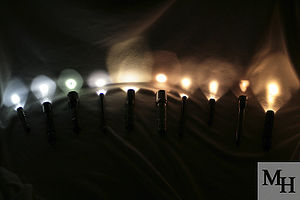Light: Difference between revisions
(start page with some basics) |
(add picture of tints) |
||
| Line 3: | Line 3: | ||
==Tints== | ==Tints== | ||
Different LED's and different types of lights produce varying tints of light. Small differences in the production of LED's can produce differing tints. The LED's are evaluated and grouped in bins based on the resulting tint. Most LED's have a cool white tint which is slightly blue. However some people prefer a more neutral light. Because more phosphor is added to obtain a neutral tint and the phosphor blocks some of the blue light, neutral LED's are not as bright as cool white ones. Warm white has more of an orange color and is even less bright, adding yellow and other colors of phosphor. But the result is broader spectrum of light that does a better job of rendering colors, a quality measured by a color rendering index (CRI) where a value of 100 accurately shows all colors in the spectrum. High CRI LED's are available but usually only in warm tints. | [[File:Ledtints.jpg|thumb|300px|Side-by-side comparison of different flashlight tints. Click for full caption.]]Different LED's and different types of lights produce varying tints of light. Small differences in the production of LED's can produce differing tints. The LED's are evaluated and grouped in bins based on the resulting tint. Most LED's have a cool white tint which is slightly blue. However some people prefer a more neutral light. Because more phosphor is added to obtain a neutral tint and the phosphor blocks some of the blue light, neutral LED's are not as bright as cool white ones. Warm white has more of an orange color and is even less bright, adding yellow and other colors of phosphor. But the result is broader spectrum of light that does a better job of rendering colors, a quality measured by a color rendering index (CRI) where a value of 100 accurately shows all colors in the spectrum. High CRI LED's are available but usually only in warm tints. | ||
==Light Output== | ==Light Output== | ||
Revision as of 20:30, 30 November 2011
Light, particularly white light, is a blend of different colors or wavelengths of light. Incandescent light bulbs offer a broad spectrum of light, including more invisible infrared light than visible light (making them less efficient). LED's produce a very narrow band of color. White LED's produce very bright blue light, but by adding yellow phosphor to the surface of the LED, a yellow wavelength is mixed in and the resulting light appears white.
Tints

Different LED's and different types of lights produce varying tints of light. Small differences in the production of LED's can produce differing tints. The LED's are evaluated and grouped in bins based on the resulting tint. Most LED's have a cool white tint which is slightly blue. However some people prefer a more neutral light. Because more phosphor is added to obtain a neutral tint and the phosphor blocks some of the blue light, neutral LED's are not as bright as cool white ones. Warm white has more of an orange color and is even less bright, adding yellow and other colors of phosphor. But the result is broader spectrum of light that does a better job of rendering colors, a quality measured by a color rendering index (CRI) where a value of 100 accurately shows all colors in the spectrum. High CRI LED's are available but usually only in warm tints.
Light Output
A light source has a total amount of output measured in lumens and a the intensity of the light at a point which is measured in lux. The intensity of the light drops with distance. See Light Output Measurements for more information on this topic.
Light Colors
Though most people prefer white light, special situations arise where a color of light is desired. Astronomers and others who want to maintain night vision and see details like maps or notes often use red light. Night vision is best preserved using blue-green light as seen in night-vision equipment. And blue light is supposedly good for seeing blood at night.